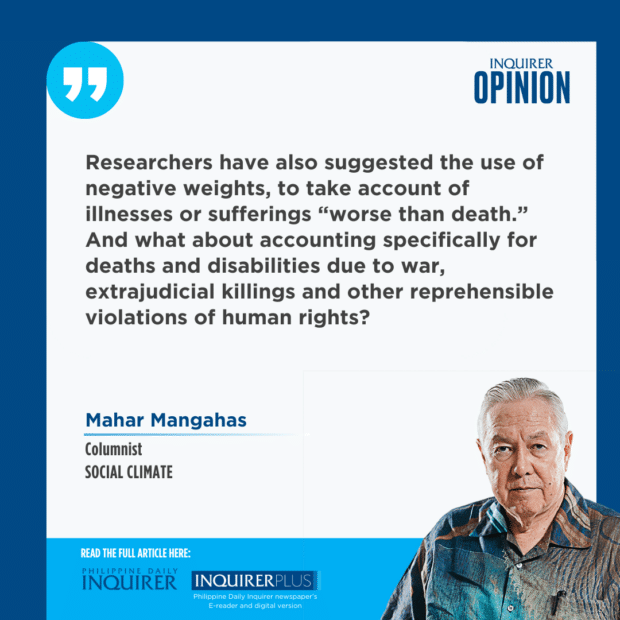Life has shortened

A Filipino born in 2021 (“latest” data) can be expected to live for 66.4 years. Back in 2000, it was 70 years. The shortening of life by 3.6 years is substantial (My reference is the World Health Organization, at data.who.int). Almost all of the total decline happened in 2020 to 2021 due to the COVID-19 pandemic, of course.
But the Philippine trend in 2000 to 2019 was already flat, which makes it unlikely that the pandemic effect has been totally corrected by now. (Why were we not at pace with the rest of the world in those decades?)
Women are somewhat better off than men: their latest life expectancy is 69.9 years, compared to 74 in 2000, or shorter by 4.1 years. Male life expectancy has fallen to 63.4 years, compared to 66.4 before, or shorter by three years. Thus, the life-length advantage of women over men has fallen from seven years before, to six years now.
Healthy life expectancy: the average number of years a person can expect to live in “full health.” The above numbers pertain to the sheer number of years of life, regardless of whether those years have been in good health or not. But suppose one year in “poor health” is counted as only a fraction, let us say 50 percent, of a normal or full-health year?
According to the WHO, the Healthy Life Expectancy (HALE) of a Filipino in 2011 was 61.4 years, which by 2021 had fallen by 2.5 years. For women in particular, the 2011 HALE was 64.1 years; it fell by 3.0 years in 2011 to 2021. For men, the 2011 HALE was 59.1 years; it fell by 2.0 years in 2011 to 2021. Thus, the advantage of women over men in healthy life years likewise narrowed by a year.
In doing this column, I did not have time for research on the WHO system of weighting life-years. I presume the weights are related to the incidence of various illnesses. Such weights could be set top-down by ”experts” and/or bottom-up by general public opinion—Social Weather Stations (SWS) has done surveys on the prevalence of illness and the self-assessed loss of functioning due to them.
Researchers have also suggested the use of negative weights, to take account of illnesses or sufferings “worse than death.” And what about accounting specifically for deaths and disabilities due to war, extrajudicial killings and other reprehensible violations of human rights?
Ruut Veenhoven, 1942-2024, Pope of Happiness. The death, last Monday of this great sociologist, my personal friend, set my general mood for the rest of the week. I cannot let my column day pass without mentioning him.
Ruut Veenhoven was, in my opinion, the single person most responsible for the present acceptability of the term “happy life years.” I met Ruut “way back in the 20th century;” we immediately became friends. He was forever smiling and joking, and often called Doctor Happiness or Professor Happiness. He was a founder of the International Society for Quality of Life Studies (ISQOLS).
The term “Pope of Happiness” was the title of the book (Springer, 2021) organized as a festschrift for him, when his terminal illness became commonly known. My own contribution to it, “Unhappiness, life-dissatisfaction and economic deprivation in the Philippines: Three decades of survey history” does not disagree with any of his views; it merely deals with one end of the spectrum of happiness.
Ruut used the knowledge of his limited time to do what made him happiest. “The thought that my death is imminent, gives me peace of mind, much to my surprise” (From his obituary, www.sws.org.ph, 12/12/24). He set aside time for his family, especially his grandchildren. He prepared for the continuity of his brainchild, the World Database of Happiness (WDH), housed in Erasmus University Rotterdam. Of course, the WDH includes data from SWS.
Ruut had a very positive view of the state of happiness in the world: “Prophets of doom associate modernization with increasing misery, but the data show a positive correlation with happiness. We now live longer and happier than ever before in human history and both longevity and happiness are still on the rise.”
Since Ruut says so, then it is true, for the world as a whole. But it is not the case in the Philippines, in this century so far.
—————-
Contact: mahar.mangahas@sws.org.ph.




















